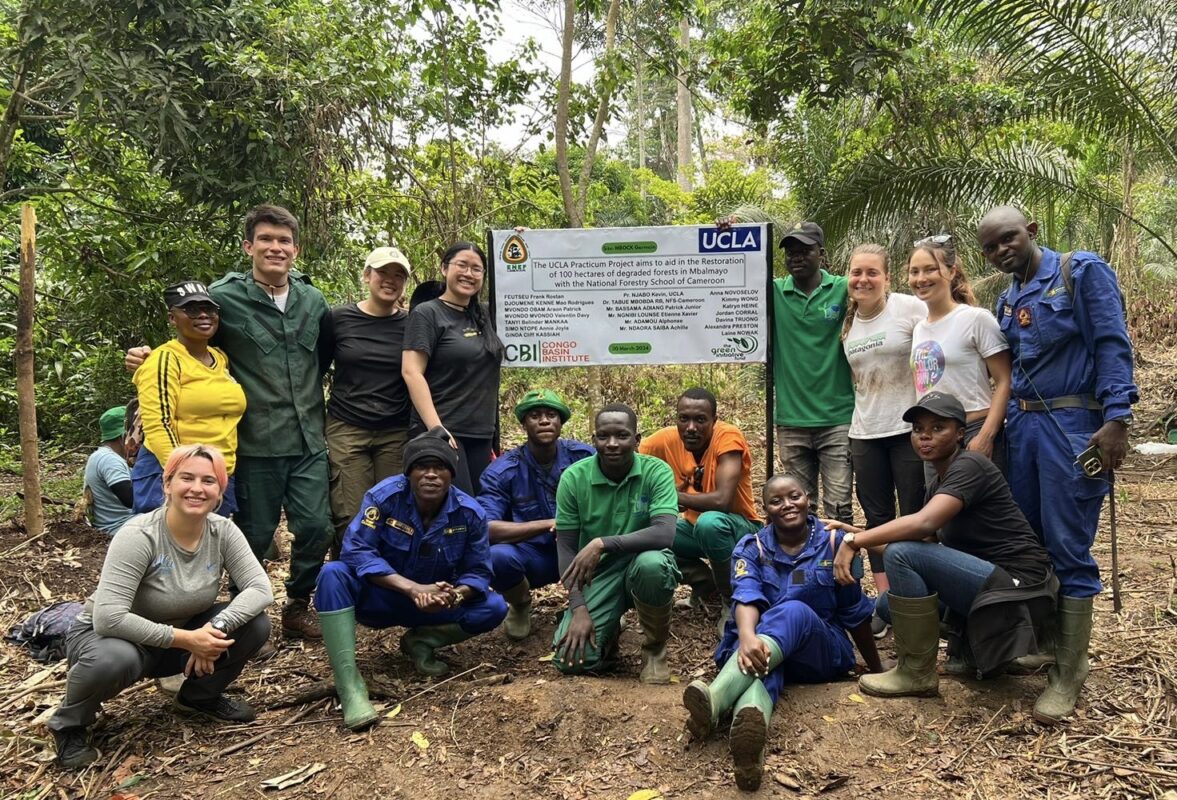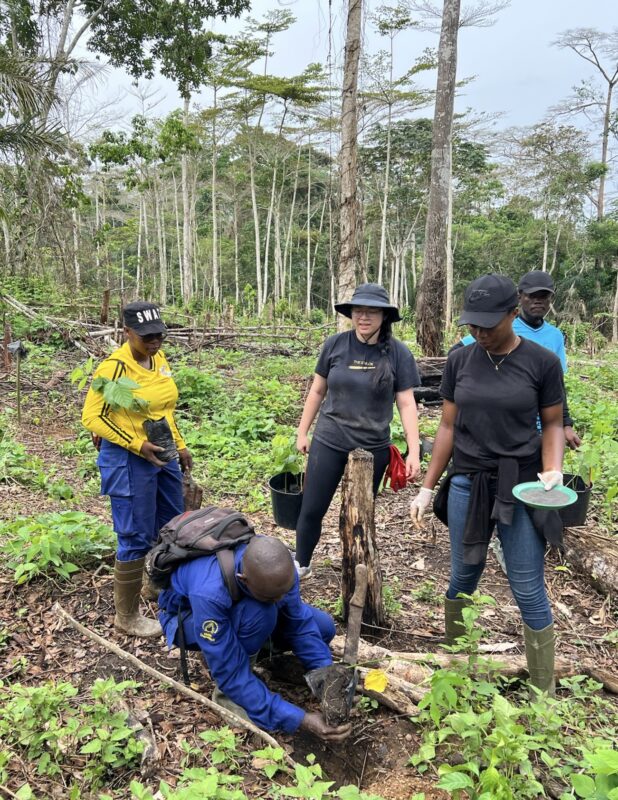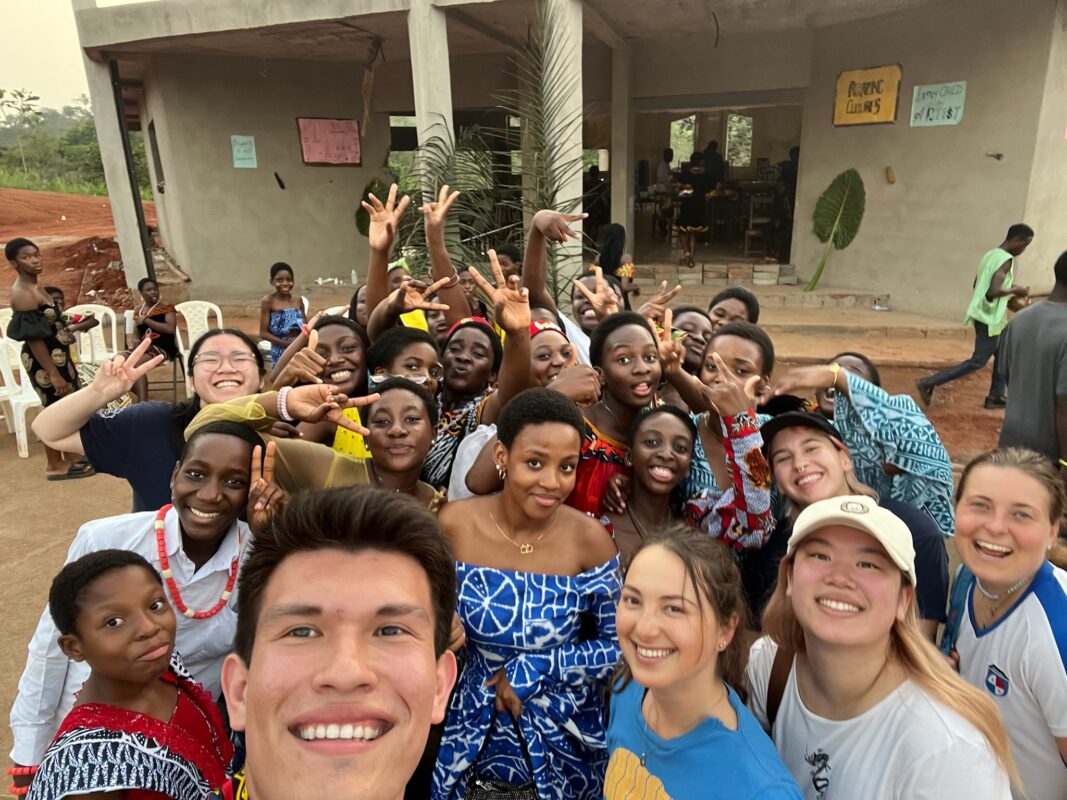
Students enhance conservation efforts and uplift local perspectives in Cameroon
In March, UCLA students joined students at National Forestry School (NFS) in Mbalmayo to plant 1,200 native trees including frake, ebony and assamela in Cameroon.
In March, UCLA students joined students at National Forestry School (NFS) in Mbalmayo to plant 1,200 native trees including frake, ebony and assamela in Cameroon.
This planting was the start of an effort to restore 100 hectares of land in the Congo Basin that has experienced large-scale degradation due to rapid urbanization and environmental pressures such as climate change, pollution and logging. If the current rate of deforestation persists, approximately 27% of the Congo Basin’s intact rainforests will be gone by 2050.
The UCLA team planted seedlings in holes dug by their Cameroonian counterparts, watered them from a nearby pond and sprinkled pesticide to prevent insects from destroying the roots.
The effort was part of their yearlong senior practicum, which pairs student teams with partner organizations and businesses to research and design approaches to address real environmental problems.
Traveling to Cameroon gave the UCLA students a chance to experience some of the challenges involved with restoration — including managing conflict between conservationists and small-scale farmers. The students administered surveys to their collaborators at the NFS to better understand local perspectives on the importance of forests and conservation.
“Worrying about the environment is a privilege not everyone has. You can’t feed your family with forested land, but you can with farmed land,” said Davina Truong, the student manager of the project. “However, forest restoration and protection have important and long-term benefits for everyone.”
The Congo Basin is the largest carbon sink in the world. It stores about 25-30 billion tons of carbon dioxide in its vegetation — equal to four years of all current carbon dioxide emissions — and supports the livelihoods of millions of people.
Forests provide resources such as food, timber and medicines while promoting biodiversity and helping to regulate the local climate. They hold immense cultural significance for indigenous people of Cameroon, including the Baka, the Bagyéli (or Bakola), and the Bedzang. In the east, some tribes use the forest for the enthronement of their “Kaggen” (king). In the west, forests are crucial for the introduction of Grassfield chiefs.
Between 2000 and 2014, 84 percent of deforestation in the Congo Basin was due to small-scale farming by local communities linked to the production of commodities like cattle, wood, cocoa, soy, palm oil, coffee and rubber. A growing population and rising global demand for products from tropical forests is predicted to spread deforestation even further.
The region is also threatened by international agricultural developers seeking to develop industrial-scale plantations for palm oil and rubber, as well as illegal logging.
Collaboration between multiple stakeholders is necessary to protect and restore forests for future generations, wrote one anonymous responder of the survey administered to the NFS students.

“We are future forest managers and experts. We always want the forest to remain a renewable resource,” the student wrote.
In the past, the NFS students typically performed restoration work plantation style, which involves planting trees of limited variety in close proximity. The UCLA practicum students focused their project on testing the effectiveness of applied nucleation: a tree planting technique based on establishing small patches of trees to promote natural forest regrowth. Additionally, the UCLA team performed a soil analysis, and identified dolomite (a mineral consisting of calcium and magnesium) as a solution to reduce the acidity of the region’s soil and improve nutrient load.
Over the following years, the NFS students will monitor the project’s progress and, if successful, incorporate applied nucleation into future forest restorations. They will also initiate conversations with locals who have burned down newly reforested land for agriculture and explain the importance of restoration efforts.
“Restoration will have the advantage of allowing the reconstitution of the plant cover, restoring soil fertility, and allowing the return of wildlife species,” said Feutseu Frank Rostan, a student at the NFS.
The broader benefits of restoration will fall short if deforestation continues at the current rate. Each year, 10 million hectares of forest land are cut down. In the Congo basin alone, 1.79 million hectares were destroyed per year between 2015 and 2020.
Part of the problem is due to global consumption of hardwood furniture, soy, rubber and processed foods prepared with palm oil. Avoiding these products gives consumers a small but important role in preventing further deforestation.
“Given that the Global North drives much of the demand that leads to deforestation and degradation, we must hold ourselves accountable and help restore, conserve, and protect these tropical forests before it’s too late,” Truong said.
Consumers can help reduce deforestation by purchasing food from local sources such as farmers markets, and by reducing their consumption of palm oil, soy, cacao, coffee and wood (especially tropical hardwoods such as mahogany). They can also purchase products that have been eco-certified by Rainforest Alliance, Forest Stewardship Council and other nonprofit organizations.
Beyond consumption, advocating policies that protect forests and rights of local communities can have an impact on the problem.
For instance, the EU Regulation on Deforestation free products, adopted last June, prevents any product that originates from recently forested land or contributes to forest deforestation from being on the EU market. Similar policies in the United States could reduce demand for deforestation in the Congo Basin and in other rainforests.
One of the most inspiring aspects of the project was connecting with the local Cameroonians, said Alexandra Preston, the social media manager for the project. During the tree plantings in late March, UCLA and NFS students chatted about their lives and ecological restoration, forging relationships despite cultural differences and language barriers.
In their time off, the team met with academic researchers and government officials, led tree planting activities at an American school, and attended a cultural day celebration at an International Boarding School, where they sampled local dishes like fufu (pounded cassava), ndole (stewed greens flavored with nuts, fish, or beef), and fried plantains.
“We were overwhelmed by everyone’s generosity,” Preston said. “Everyone was eager to share — their delicious food, their time answering our many questions, their dance and their music, knowledge of their home, language, and thoughts on politics.”


